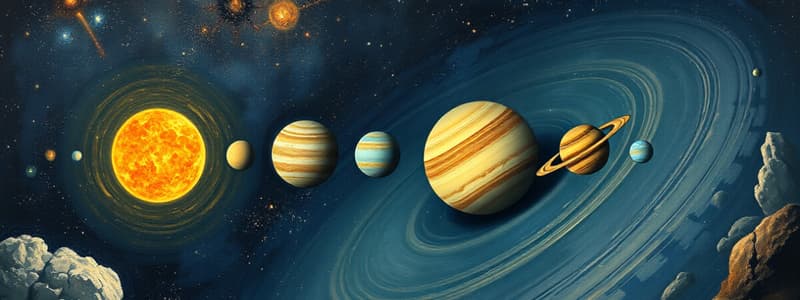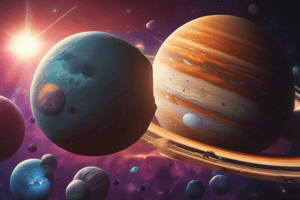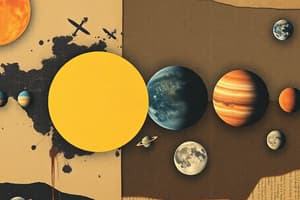Podcast
Questions and Answers
Our Solar System is located in which galaxy?
Our Solar System is located in which galaxy?
Milky Way
How old is our Solar System?
How old is our Solar System?
4.6 Billion Years
What are the inner planets or terrestrial planets?
What are the inner planets or terrestrial planets?
Mercury, Venus, Earth and Mars
What are the outer planets or gas giants?
What are the outer planets or gas giants?
What is at the center of the solar system?
What is at the center of the solar system?
Enumerate the 8 planets in order from the Sun.
Enumerate the 8 planets in order from the Sun.
What makes the Earth unique?
What makes the Earth unique?
What is a comprehensive term used for all sciences related to Earth?
What is a comprehensive term used for all sciences related to Earth?
What is the composition of Earth’s surface?
What is the composition of Earth’s surface?
What are the four major systems of the Earth?
What are the four major systems of the Earth?
What does the atmosphere include?
What does the atmosphere include?
What is the troposphere?
What is the troposphere?
What is the stratosphere known for?
What is the stratosphere known for?
Where do meteors usually burn up?
Where do meteors usually burn up?
What is the thermosphere known for?
What is the thermosphere known for?
What does the exosphere refer to?
What does the exosphere refer to?
What is the hydrosphere composed of?
What is the hydrosphere composed of?
What is the geosphere?
What is the geosphere?
What is the biosphere?
What is the biosphere?
Are the four spheres connected to each other?
Are the four spheres connected to each other?
Flashcards are hidden until you start studying
Study Notes
Overview of the Solar System
- Our Solar System is located in the Milky Way galaxy.
- It is approximately 4.6 billion years old.
- The eight planets, in order from the Sun, are Mercury, Venus, Earth, Mars, Jupiter, Saturn, Uranus, and Neptune.
- Inner planets (terrestrial): Mercury, Venus, Earth, Mars.
- Outer planets (gas giants or jovian): Jupiter, Saturn, Uranus, Neptune.
- The Sun is at the center of the solar system.
Characteristics of Earth
- Unique for being the only planet in the solar system that supports life.
- Earth is known for its blue waters and rocky landmasses seen against a black background from space.
- It is the third planet from the Sun and the fifth largest in the solar system.
- Comprises 70% water and 30% land.
Earth Systems
- Four major systems of the Earth:
- Atmosphere: Contains air, precipitation, clouds, and aerosols.
- Hydrosphere: Includes all of Earth’s water, existing in liquid, vapor, and ice forms.
- Geosphere: Solid portion of Earth, composed of its structure and land.
- Biosphere: Zone of life where living organisms exist.
Atmosphere Composition
- Mixture of gases including oxygen, nitrogen, argon, and carbon dioxide.
- Essential for weather patterns and ecological processes.
Layers of the Atmosphere
- Troposphere: Extends 8 to 14.5 kilometers high; where most weather occurs.
- Stratosphere: Up to 50 kilometers; contains the ozone layer that protects against UV radiation.
- Mesosphere: Extends to 85 kilometers; where meteors burn up.
- Thermosphere: Extends up to 600 kilometers; location of aurora and satellites.
- Ionosphere: Layer of ionized atoms and molecules, from 48 kilometers to 965 kilometers; fluctuates with solar activity.
- Exosphere: Upper limit of the atmosphere, reaching up to 10,000 kilometers; where atoms escape into space.
Hydrosphere
- Comprises all water bodies on or near Earth's surface: oceans, rivers, lakes, and aquifers.
- Water exists in liquid, vapor, and solid forms (cryosphere).
- Oceans contain 97% of Earth’s water, while fresh water makes up 3%.
Geosphere
- Solid portion of Earth; derived from the Latin word "geo" meaning ground.
- Composed of several parts:
- Crust
- Upper Mantle
- Lower Mantle
- Outer Core
- Inner Core
Biosphere
- Known as the "zone of life," extending about 20 kilometers from the top of the atmosphere to the bottom.
- Life has existed for approximately 3.5 billion years.
Interconnectedness of Earth Systems
- The four spheres (atmosphere, hydrosphere, geosphere, biosphere) are closely linked.
- Changes in one sphere can significantly affect the others, highlighting the interdependence of Earth's systems.
Studying That Suits You
Use AI to generate personalized quizzes and flashcards to suit your learning preferences.




